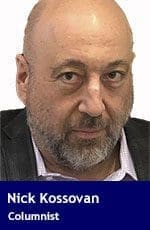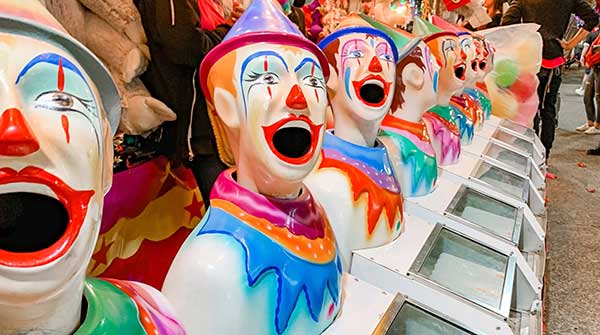Send in the clowns
 Given the ever-increasing number of would-be candidates making pre-nomination announcements, it does not take a mathematical wizard to predict that whoever wins the upcoming Toronto mayoral by-election on Jun. 26 will have received at most 20 percent of the votes.
Given the ever-increasing number of would-be candidates making pre-nomination announcements, it does not take a mathematical wizard to predict that whoever wins the upcoming Toronto mayoral by-election on Jun. 26 will have received at most 20 percent of the votes.
John Tory was not challenged by a notable candidate in the past two elections. Now, with Tory out of the picture, many well-known Torontonians are taking advantage of not having to overcome his incumbency and are announcing they will be running in the upcoming by-election to become Toronto’s 66th mayor.
I estimate there will be 75 to 90 candidates running for mayor.
Even though Tory’s incumbency will not be a factor in this mayoral election, name recognition will be the key ingredient to winning an election. The importance of having name recognition irks those mayoral candidates who feel entitled to be mayor of North America’s fourth most populous city without ever having spent years visibility participating in their community or grooming themselves to become mayor. (e.g., Volunteer for a candidate running for council, join a councillor’s staff, run for council – activities to gain city hall experience and network with people who can help you.)
To run a competitive campaign, candidates need the following:
- Money (donors)
- A team (communications, fundraising, canvassing)
- Visibility
Currently, the following notable names have announced or indicated that they are considering running for mayor:
- Ana Bailão, former city councillor
- Anthony Furey, newspaper columnist and broadcaster
- Brad Bradford, city councillor
- Gil Penalosa, Urbanist; former mayoral candidate (In the October 2022 Toronto election, Gil came in second with 98,525 votes – 17.85 percent of the votes)
- Giorgio Mammoliti, former city councillor
- Josh Matlow, city councillor
- Mark Saunders, former police chief
- Mitzie Hunter, Liberal MPP
- Olivia Chow, former city councillor; former NDP MP
- Rob Davis, former city councillor
- Stephen Holyday, city councillor
Based on the social media chatter I am seeing, there will be many “lesser known” mayoral candidates.
The ease of getting your name on the ballot – a Toronto mayoral candidate does not have to be affiliated with a political party; all it takes is $200 and 25 signatures – results in many candidates running for mayor, or city council, knowing they have no chance of winning, thus creating lots of noise and “circus-like” distraction.
When I see how little effort some candidates put into winning an election, I wonder what motivated them to run. Is it so they can state on their resume or LinkedIn profile that they ran for mayor? Do they think they will become quasi-famous? Are they just running for a laugh?
As Torontonians will soon see, as they have in past elections, most mayoral candidates are not in the election race to win but to make some sort of “statement.”
***
Even before nominations opened, the media was shaping the field of candidates for the by-election to begin controlling the narrative.
On Mar. 26, for example, the Toronto Star reported, under the headline Olivia Chow, Mark Saunders Lead in Poll of Potential Toronto Mayoral Candidates a Forum Research survey which found Olivia Chow and Mark Saunders had the most support ahead of the official start date of the by-election on Apr. 3.
Once nominations close, and it is known who the official mayoral candidates are, the media will go into overdrive, covering those candidates they deem to be “preferred” – further shaping the field – which is their prerogative. No candidate is owed media coverage.
Candidates should recognize they are no longer media-reliant to spread their message. Social media proficiency, understanding grassroots marketing, and, most importantly, going out and meeting Torontonians will spread their message. Whether their message will compel voters to vote for them is another matter entirely.
***
As in last October’s election, the following issues concern most Torontonians.
- Affordable housing
- Crime, especially gun violence, and
- Public transportation
Holistically, Torontonians want a city that is reasonably affordable and clean, in which they feel safe and has reliable public transportation.
Toronto is an expensive city to live in – no one would argue otherwise – and is a member of the “large world-class city” club. Choosing to live in a large world-class city such as New York, Singapore, Paris, Zurich and San Francisco, cities with a higher cost of living than Toronto, comes at a price and is not for everyone. It is naive to expect Toronto to be as affordable as Saskatoon, Halifax, or Quebec City or that the mayor can control the cost of living.
In addition to affordability, a city the size of Toronto will inevitably face “big city” issues such as crime, congestion, homelessness, and stressed infrastructures. Toronto is not immune to the problems all big cities face.
What Torontonians need to ask themselves during the campaign: “Which mayoral candidate has the experience and integrity to make a full-out honest attempt at creating the Toronto I want?”
***
Torontonians, at least those who bother to vote – only 549,305 of the 1.89 million eligible voters voted last October – will have lots of candidates to choose from.
They should expect this by-election to consist of finger-pointing, mudslinging, and candidates making vote-bait promises – promises that cannot be kept because they are outside the mayor’s jurisdiction or are made with no intention of being kept – as candidates do whatever they feel they need to do to attract voters’ attention. This will result in voters splitting the vote among the top 10 candidates; hence why I predict the next Toronto mayor will win with less than 20 percent of the vote.
There is, however, an opportunity presented by this by-election.
For 19 of the last 26 years, Conservatives have controlled Toronto’s Mayor’s office via Mel Lastman, Rob Ford, and John Tory. During the other seven years, it was held by centre-left David Miller. This by-election is an opportunity for a candidate who identifies as a “progressive,” who believes that political action can improve human societies and is therefore mildly left-leaning, to become mayor. However, there is one problem which may change before nominations close: a lack of progressive candidates.
No perfect or near-perfect progressive candidate has appeared, one with the name recognition and familiarity to motivate traditional progressive voters and who can fundraise substantially and has a well-oiled campaign team. Such a candidate may yet appear. For now, however, it looks as if the candidates will either be far-right or far-left and are running to serve their political aspirations.
The mayor’s seat, by its very definition, should be occupied by someone who is a servant to the people. Yet Torontonians keep voting for career politicians and then wonder why the city’s fiscal management is influenced by politics.
Common sense and fiscal responsibility should drive the decisions made by city hall, not politics!
***
What this by-election needs is three consensus candidates:
- A right-leaning candidate
- A left-leaning candidate
- The candidate Toronto needs
Candidates who want to have any chance of winning this by-election, especially given how many prominent and well-connected mayoral candidates there will be, need to adopt the following strategies:
- Quickly mount a professionally managed and well-funded campaign.
- Get endorsements from well-known organizations, business and community leaders and influencers.
- Appeal to both the left and the centre.
- Demonstrate a deep understanding and track record of addressing Toronto’s homeless and the housing challenges faced, especially for refugees, seniors, and youth.
- Offer an exciting, long-term vision and platform for Toronto that addresses the three issues I mentioned Torontonians are concerned about and give compelling reasons why their experience makes them the best candidate to lead Toronto.
- Promise to keep Jennifer McKelvie on as Deputy Mayor.
If all the notable people rumoured to be running file their nomination papers before May 12, Torontonians could expect to witness an exciting, entertaining, and hypercompetitive mayor’s race, potentially increasing voter turnout. If a circus of political theatrics is what is needed to get Torontonians to vote, then let the circus come to town!
Nick Kossovan, a self-described connoisseur of human psychology, writes about what’s on his mind from Toronto.
For interview requests, click here.
The opinions expressed by our columnists and contributors are theirs alone and do not inherently or expressly reflect the views of our publication.
© Troy Media
Troy Media is an editorial content provider to media outlets and its own hosted community news outlets across Canada.


